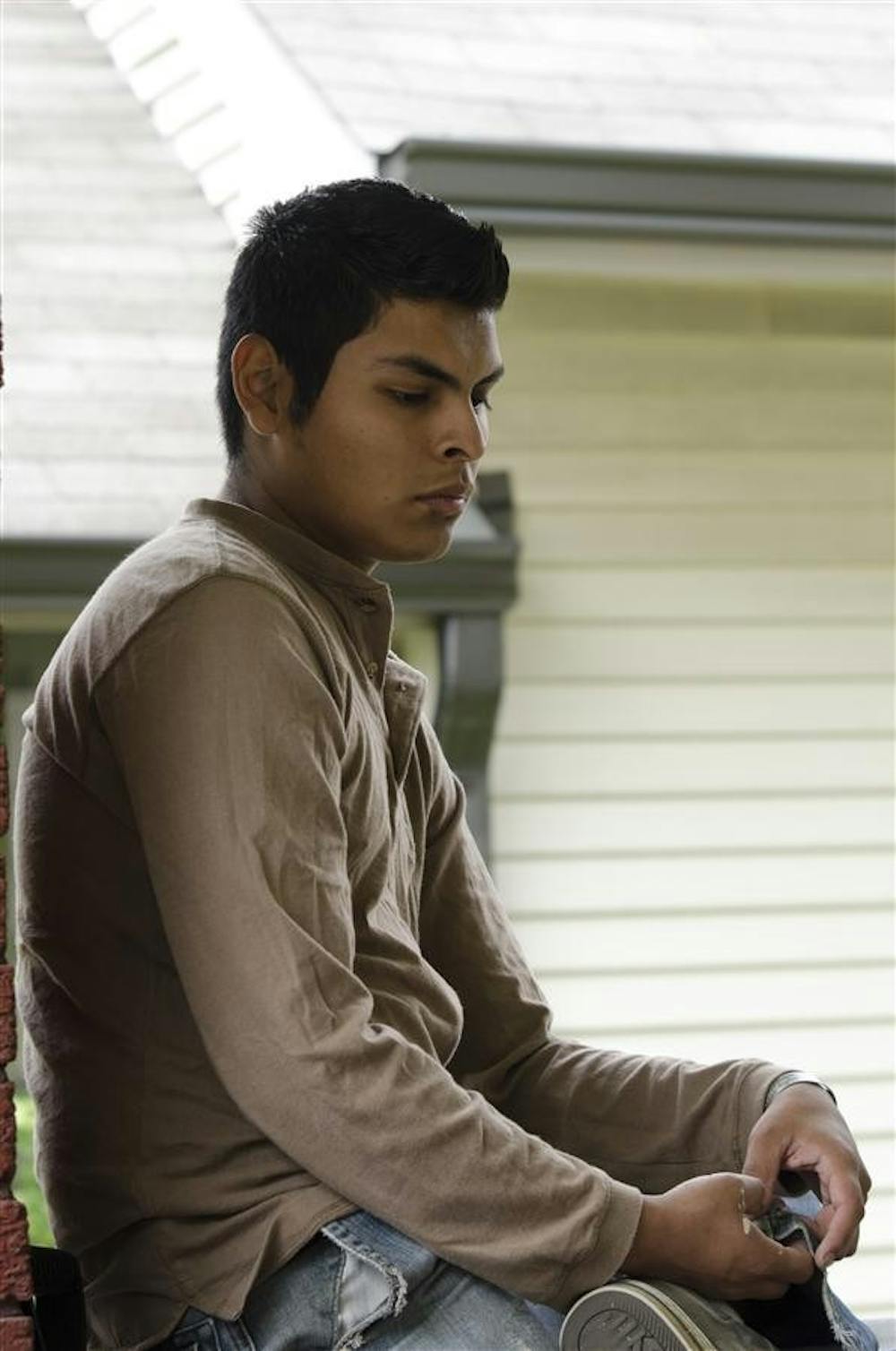Erick and Omar Gama moved from Mexico to Indianapolis when they were 11. They didn’t know the language, they didn’t have documentation and they were often made fun of at school because of their lack of English skills.
The two brothers aren’t sure how they passed that year of fifth grade when they look back at their transcripts and see only D’s and F’s. But by the eighth grade, they were moved out of the English as a second language program and were accepted into the Magnet program, which is for advanced students in Indianapolis Public Schools.
As it came time to graduate from Arsenal Tech High School, they worried about applying for college like most seniors. However, they were concerned that their illegal status would hold them back.
They applied to the University of Indianapolis and Erick was offered a full ride, but he had to turn it down because he’d never been assigned a social security number. When they applied to IU, they were also accepted.
“Once we got accepted, we were like, ‘Oh my god we made it, we’re in college,’”
Erick said. The Gamas were nervous when attending IU’s orientation because they knew the University would ask for their visas or passports, but when they said they didn’t have either, it wasn’t a problem.
They even qualified for in-state tuition because IU’s requirements say that in order to be an Indiana resident, one must reside in the state for at least 12 months.
The Gamas will be juniors in the fall, and in their minds, they have been Hoosiers since they were 11. But now the law tells them differently.
Gov. Mitch Daniels signed HB 1402 into law May 10 which states that undocumented students will be required to pay out-of-state tuition. For the Gamas, that means a tuition increase of about $18,000 each.
Since they are undocumented, they can’t fill out the FAFSA, and they don’t qualify for scholarships, except for a few private ones.
Growing up, both brothers were offered the 21st Century Scholars Program, but without documentation they couldn’t accept it.
They also don’t qualify for loans or the Pell Grant. When their bursar bill arrives, they each have to pay out of pocket.As far as they’re concerned, they’re Indiana
residents.
BECOMING A LEGAL CITIZEN
Erick has read that it’s easy to become a legal citizen, and he’s had people ask him, “Why don’t you just apply for the documents?” But it’s not that easy.
The brothers talked to an immigration lawyer about a year ago, and he said that they don’t qualify for legal status based on how their parents arrived in the U.S. They were told that their best bet is to wait for immigration reform.
Before coming to Indiana, their parents tried to apply for a visa, but they were denied at least five times.
“People say it’s easier to stay illegal, and I’m like ‘No, it would be easier to be legal.’ But there’s not a way to do it,” Erick said.
Omar said he hears people say “Go to the back of the line,” but that wait can be years. He said he’d rather do what they’re doing now than wait because Indiana is already his home.
He also hates hearing people say their tax dollars are paying for illegal immigrants. The Gamas parents pay property taxes on two houses and they pay sales taxes like everyone else, they said.
There are four ways to qualify for legal status, and many immigrants don’t fall into one of those categories, Maria López, a law professor at IU-Purdue University Indianapolis, said.
The popular forms of immigration are family-based, meaning an immigrant is sponsored by a family member that is already a citizen, and employment-based, but that usually only applies to highly-skilled workers, for which many immigrants don’t qualify.
Some people also qualify for refugee immigration, but that’s for people living in political, racial or religious hardship. An economic hardship doesn’t qualify, Lopez said.
There is also a lottery visa, which usually applies to countries that don’t have a lot of immigrants.
For most children of illegal immigrants, it’s very difficult to get legal status, Lopez said, because they don’t fall under any of the four categories.
She said she worries that people are trying to make life here so difficult that the children of illegal immigrants will leave.
“If you think you’ll make their lives bad that they’ll go back,” she said, “then you should see the conditions in their own country.”
She said the best thing for children to do is get educated because life in the U.S. is all they know.
“If you put obstacles on their education,” she said, “what can they do?”
A NATIONAL DISCREPANCY
While Indiana passed legislation saying undocumented students must pay out-of-state tuition, Maryland recently passed a law that said undocumented students can now pay in-state tuition.
By doing so, Maryland joined 11 other states that allow in-state tuition.
This discrepancy among states to pass immigration legislation is mostly because of frustration caused by the federal government’s failed attempts to pass legislation on the subject, Marshall Fitz, director of Immigration Policy at the Center for American Progress, said.
What the country is seeing, Fitz said, is an increased activity in statehouses to pass legislation not only about tuition, but about the rights of illegal immigrants in general. However, Fitz said, immigration is not an issue that can be resolved at the local level.
“I think states making decisions does nothing but add fuel to the fire,” Fitz said. “I think people know that we’re not going to have 50 different state immigration laws.”
In order to pass immigration reform, Congress needs bipartisanship, Fitz said, and it’s a time when bipartisanship has become increasingly scarce.
“I think there are a lot of politicians who think it’s easier to ignore the issue,”
Fitz said. Fitz also said he worries that politicians are scared to support immigration reform because moderates in a moderate state can no longer feel safe that they’ll be re-elected. Even Sen. Richard Lugar has declined to be a part of the bill, and he’s known to support immigration reform.
“Even a guy who has a 70 percent approval rating is clearly spooked by the
viciousness of attacks that were sent at the moderates in the 2010 cycle,” Fitz said.
Until then, the Gamas plan to continue to support the DREAM Act, which would qualify the children of illegal immigrants for conditional nonimmigrant status if they graduate from a U.S. high school, are accepted into college or earn their GED.
THEIR FIRST NIGHT IN JAIL
As Gov. Daniels drew closer to signing HB 1402, the Gama brothers became more desperate. They had been e-mailing and calling his office for weeks trying to set up an appointment with him to tell their stories of how, without in-state tuition, they wouldn’t have an education at all. But they received no response.
So they went to the statehouse May 9, the day before Daniels was to sign the legislation, and sat outside his office with three other students in their graduation gowns.
“They said, ‘Well he’s not going to be here because his agenda’s full and you don’t have an appointment.’ So we said we could wait, that’s fine,” Erick said.
After being warned several times, the group was arrested. Going into the protest, the Gamas knew arrest was a possibility. They discussed it with their families and decided they had nothing to lose. They wrote profiles to send to the media and created YouTube videos so people could know their story if they were arrested.
It took a stop at Wendy’s for an officer to order some nuggets and about 24 hours at the processing center before the group even reached the jail.
Once there, they went on a hunger strike, which they said wasn’t hard to do.
They were served some tacos with cold tortillas, a little bit of lettuce, packets of sauce and rice “that tasted like water and beans,” Erick said. “It wasn’t hard to put
them down.”
The group didn’t find out that Immigration and Customs Enforcement had a hold on them for possible deportation until a deputy briefly mentioned it.
They will return to court June 14 for Class A trespassing and Class B disorderly conduct, both misdemeanors. They could be sentenced from zero to 365 days for the Class A charge and up to 180 days for the Class B charge.
However, they said they’re more concerned about whether they will be able to return to school than about their punishment.
IU spokesperson Larry MacIntyre said the University must comply with the new legislation, and the University is doing a review of how that will be done. The state law will go into effect July 1.
With the tuition increase, Erick said they’ll have to be part-time students, maybe only taking two classes at a time. However, they said they have every intention of graduating. Indiana is their home and it’s where they want to live after graduation.
“We’re going to continue no matter what,” Erick said. “It’ll probably take forever to graduate, but we’re going to graduate.”
Gama brothers define home with passing of HEA 1402

Get stories like this in your inbox
Subscribe





